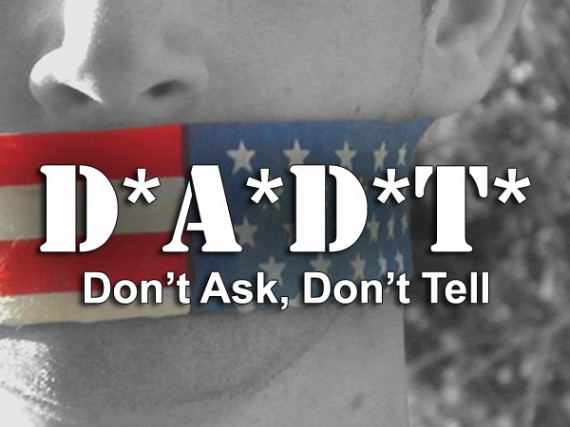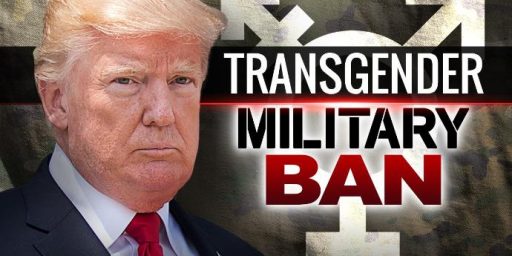Federal Judge Enjoins Military From Enforcing Don’t Ask, Don’t Tell
A Federal Judge in California has struck another blow to the military's Don't Ask, Don't Tell policy. Now, the ball is in President Obama's court.
Last month, Federal Judge Virginia Philips issued an opinion declaring the military’s Don’t Ask, Don’t Tell policy to be unconstitutional. For the past month, the Plaintiffs and the Federal Government have been engaged in a legal battle over the scope of the injunction that Phillips would issue in light of her order. Today, Judge Phillips pretty much gave the Plaintiffs everything they wanted and issued an injunction forbidding the military from enforcing Don’t Ask, Don’t Tell at all:
SAN DIEGO (AP) — A federal judge issued a worldwide injunction Tuesday stopping enforcement of the “don’t ask, don’t tell” policy, ending the military’s 17-year-old ban on openly gay troops.
U.S. District Judge Virginia Phillips’ landmark ruling was widely cheered by gay rights organizations that credited her with getting accomplished what President Obama and Washington politics could not.
“This order from Judge Phillips is another historic and courageous step in the right direction, a step that Congress has been noticeably slow in taking,” said Alexander Nicholson, executive director of Servicemembers United and the sole named veteran plaintiff in the case along with the Log Cabin Republicans.
Servicemembers United is the nation’s largest organization of gay and lesbian troops and veterans.
U.S. Department of Justice attorneys have 60 days to appeal. Legal experts say the department is under no legal obligation to do so and could let Phillips’ ruling stand.
Phillips declared the law unconstitutional after a two-week nonjury trial in federal court in Riverside. She said the Log Cabin Republicans “established at trial that the Don’t Ask, Don’t Tell Act irreparably injures servicemembers by infringing their fundamental rights.”
She said the policy violates due process rights, freedom of speech and the right to petition the government for redress of grievances guaranteed by the First Amendment.
“Furthermore, there is no adequate remedy at law to prevent the continued violation of servicemembers’ rights or to compensate them for violation of their rights,” Phillips said.
She said Department of Justice attorneys did not address these issues in their objection to her expected injunction.
And, now, once again, the ball is in the Obama Administration’s court. They could. if they chose to do so, decide not to appeal Judge Phillips ruling. In that case, the injunction would remain in place and DADT would effectively be a legal nullity. Congress would still have the opportunity to act to repeal the policy entirely and allow gays and lesbians to serve openly without fear of reprisal, which they certainly should do, but until that time the policy would not be enforced. Since the Administration has sixty days to make this decision, there’s no reason for them to do anything before Election Day, of course, which may make it easier for the White House to finally make good on a promise that the President made during the campaign, and repeated against in January.
Update: Here’s a copy of the Injunction Order:
Injunction Order In Log Cabin Republicans v. United States et al







No nodding and winking Doug?
What, dare I ask, does that even mean ?
I’m still confused by this.
My understanding is that gays are not allowed to serve in the military (just as women are not allowed to serve into certain roles). Congress passed a law, DADT, which restricted the military’s ability to investigate and enforce this prohibition. It seems to me that by striking DADT, you’ve eliminated the remedial provisions, but retained the blanket prohibition. It would seem to me the ruling would make it worse for homosexuals.
Or am I mistaken, and DADT became the blanket prohibition?
“What, dare I ask, does that even mean ?”
We cynics keep this knowledge to ourselves.
PD,
My understanding is the Don’t Ask, Don’t Tell — which was originally called Don’t Ask, Don’t Tell, Don’t Pursue interestingly enough — replaced the previous default rule that homosexuality was a permanent bar to military service.
Also, I would have to read to the terms of the Judge’s injunction order to be sure, but I would suspect that Judge Phillips crafted the injunction in a way that puts any discharge from the military based on sexual orientation under prohibition.
The injunction is here:
http://www.politico.com/static/PPM153_dadt.html
It looks like the previous prohibition was by executive order under Reagan, which was withdrawn after DADT was enacted. I wonder if Obama could reinstate DADT by executive order, not necessarily because he supports DADT, but to provide the discretion to enact his own post-DADT policy. Otherwise, I think he is going to have to appeal, at least to preserve the discretion to enact the policy he wants. He may even use the threat of dropping the appeal to get Congress and his generals to act.
‘Otherwise, I think he is going to have to appeal, at least to preserve the discretion to enact the policy he wants. He may even use the threat of dropping the appeal to get Congress and his generals to act.”
Either way he gets his way and delivers on his promise. I rather suspect he won’t appeal which would be the Sun Tsu approach.
What sort of policy do you think he needs to enact PD?
What’s so complicated about letting us serve without being forced to lie about who we are?
I would think not appealing would be shirking his duty to faithfully execute laws passed by Congress.
And, while I support repealing DADT and the policies against homosexuals serving, it’s absurd that a district court judge would have the power to enjoin the enforcement of a decades-old, consensus policy. These sorts of things should be fast-tracked to SCOTUS and enforcement held in abeyance in the interim.
“What sort of policy do you think he needs to enact PD?”
Obama should direct Defense to complete and issue the study it’s promised on the issue.
The part that gets me about this whole affair, is that everyone knows there are gays in the military…. under DADT, nobody knows who they are. So, a homophobe has to suspect everyone.
Without DADT, a homophobe can know who at least SOME GLBT people are and avoid them in the shower… as is, he has no idea.
When is living a lie a good idea?
“I would think not appealing would be shirking his duty to faithfully execute laws passed by Congress. ”
Huh? What does this even mean? How does a decision to appeal or not appeal somehow fall under the category of “executing the laws”?
He has a duty to faithfully execute the laws of the country, period – I don’t know why you put that “passed by Congress” bit on there. Yes, passed by Congress, as all laws must be, and signed by the president (or his veto overriden) and not struck down by the Courts.
Once a Court strikes down a law, it is no longer a law – so why do you imagine he has further responsibilities to faithfully execute it?
I would accept that in most cases, especially with laws that deal with national issues like this, it would be smart of him to help the case make its way to the Supreme Court so that there can be a definitive national ruling on the matter, and that might mean appealing the case, even if he agrees with the lower court’s ruling. But I don’t know why you would characterize that as his duty, on a par with faithfully executing the laws.
“And, while I support repealing DADT and the policies against homosexuals serving, it’s absurd that a district court judge would have the power to enjoin the enforcement of a decades-old, consensus policy.”
This statement just strikes me as weird. Process matters, but I can’t see myself saying the same thing about other issues I support. “Yeah, I really support the legalization of marijuana…but not if a district court judge overturns decades-old, consensus policy.” Sometimes the decades-old, consensus policy is so odious that it must be chucked, as one guy who fought against different discriminatory policies, “by any means necessary.”
Should be:
Sometimes the decades-old, consensus policy is so odious that it must be chucked, as one guy who fought against different discriminatory policies once said, “by any means necessary.”
James Joyner says:
Tuesday, October 12, 2010 at 17:47
I would think not appealing would be shirking his duty to faithfully execute laws passed by Congress.
yeah right Jim.
“s absurd that a district court judge would have the power to enjoin the enforcement of a decades-old, consensus policy.”
Actually, the consensus view of the elected officials of the federal government – that is the President, a majority of the House, and a majority (but not a filibuster-proof majority) of the Senate, is that DADT shall end.
So the district court judge actually agrees with the consensus policy.
Tano, take a different hypothetical. Bush signed the McCain/Feingold legislation grudgingly under political pressure. Let’s say the first judge that reviewed a Constitutional challenge of that law ruled it was completely unconstitutional. Would you, or more precisely supporters of campaign finance reform, shrug their shoulders if Bush took advantage of that opportunity to allow a judge do for him, what he couldn’t do through the political process?
I think there is a critical difference between refusing to prosecute a case that the President thinks unjust to an individual on the facts. I think the facts in this case were fairly sympathetic to the lady who AIUI was asked, but didn’t tell, and was thrown out for behavior taking place entirely off base.
But that bus passed a long time ago, and now we have a law passed by two houses of Congress and signed by the President and the President should stick up for the law. If not, this is a game that easily can play both ways. Republicans can just as easily find a district court judge sympathetic to invalidating laws that peeve them.
My anger over the fact that men and women who are prepared to give their lives to defend my freedom are being forced to live a lie goes a little bit beyond being “peeved”.
“Would you, or more precisely supporters of campaign finance reform, shrug their shoulders if Bush took advantage of that opportunity to allow a judge do for him, what he couldn’t do through the political process?”
No, there would be gnashing of teeth and rending of Bush effigies. But that is a political argument. It is quite different from claiming that he would be abandoning his duties to faithfully execute the laws. That latter standard is pretty close to an indictment for treason, or at least a high crime worthy of impeachment.
“…the President should stick up for the law. ”
Why? if it is against the judiciary?
“Republicans can just as easily find a district court judge sympathetic to invalidating laws that peeve them.”
I am not saying that the district court’s opinion must be the final word. If there are aggrieved parties that arise from the overturning of some law, then they can bring suit. But the sitting President has a right to decide whether or not his government is going to argue against a district court ruling or not.
Do you think that if some future District court were to rule that Obamacare is unconstitutional that a President Palin would appeal that decision? Would vigorously defend the law?
I can’t see how the president, or if he refuses, Congress can not appeal this direct attack on the powers of Congress. Regardless of whether DADT is right or wrong, the findings in 10 USC 654 state:
Really, anyone expect Congress to let some District judge completely undermine their enumerated power? A power they explicitly incorporated into the law?
“Really, anyone expect Congress to let some District judge completely undermine their enumerated power? A power they explicitly incorporated into the law?”
Checks and balances anyone?
Exactly. If there’s going to be a fight, it’ll be with SCOTUS. So Congress either surrenders the power to some District judge or they fight with SCOTUS over the “make rules for the government and regulation of the land and naval forces.”
Not to mention, in the Armed forces you don’t have full freedom of speech. So if this stands, just where do 10 USC
§ 888. Art. 88. Contempt toward officials
§ 889. Art. 89. Disrespect toward superior commissioned officer
§ 891. Art. 91. Insubordinate conduct toward warrant officer, noncommissioned officer, or petty officer:
(3) treats with contempt or is disrespectful in language or deportment toward a warrant officer, noncommissioned officer, or petty officer, while that officer is in the execution of his office;
stand? Would those offenses in the UCMJ infringe upon a servicemembers First Amendment rights and thus by corollary be unconstitutional?
“Congress either surrenders the power to some District judge or they fight with SCOTUS”
I think you are forgetting the fact that the majority of both houses are against DADT. You seem to expect them to advance arguments in the courts that they do not actually believe in. Why do you think that would happen?
Power. Surrender your enumerated power, good luck getting it back. One thing about DC, they don’t give up power without a fight.
Of course, Congress could just change the law and dissolve the question.
Pride. The Solicitor General’s office sees itself as having the duty to defend acts of Congress, whether they believe in them or not. When questioned about the parameters of this duty, Clinton’s S.G. identified two exceptions: (1) when the act of Congress is in conflict with executive powers, or (2) where the Act has repeatedly been held unconstitutional, neither of which apply here.
http://scholarship.law.georgetown.edu/cgi/viewcontent.cgi?article=1280&context=facpub
But by declining to pursue an appeal of this case, they are in no way surrendering anything beyond the outcome of this particular case – and they agree with the outcome that the District court rendered.. The courts are not going away, and an appeal, whether it is successful or not, will not change anything about the fundamental division of enumerated power. It will only overturn this law, a law that a majority, but not a filibuster-proof majority, opposes.
I’m not sure this court order does what the judge seems to think it does…
It doesn’t prevent the government from enforcing 10 USC section 654, the law that actually bans homosexuals from serving in the military. It only bans “Don’t ask don’t tell”, the law the requires soldiers not to reveal their sexual orientation and officers to to enquire about it.
It could be interpreted that what this order actually does is require the military to immediately begin investigating the orientation of every single soldier in the armed services.
Congress asserts that they have exclusive jurisdiction to “make rules for the government and regulation of the land and naval forces”, including conditions and qualifications for service. Letting a court ruling, even if amenable, to stand is an acknowledgement that the court has jurisdiction over the “government and regulation of the land and naval forces”, including the conditions and qualifications of service, which kind of undermines the exclusive jurisdiction argument. Good luck arguing that the courts do not have jurisdiction over, say, height requirements for fighter pilots in the future.
Anyway, what a fitting way to end such a horrible Congress, by demonstrating complete lack of will to hold a vote to exercise specific powers granted to Congress just because it might be controversial but totally willing to surrender Congressional authority over the land and naval forces if someone else will do the hard work.
JKB,
I think that argument is a couple of hundred years too late. The courts have the authority to rule on the constitutionality of all laws.
The courts do not have the authority to make rules for the regulation of the armed forces, but they sure as hell can strike down a particular rule. Their justification, of course, is that any rule or any law that the Congress decides to implement must be compatible with the rest of the Constitution. And the Courts are the institution that makes that judgement.
“Really, anyone expect Congress to let some District judge completely undermine their enumerated power? A power they explicitly incorporated into the law?”
Funny how you have no problem with the courts overthrowing other congressional legislation.
“Anyway, what a fitting way to end such a horrible Congress,”
Yeah it’ just passed some of the most important legislation for 40 years that will affect ordinary Americans positively. Leadbetter. HCR. Financial Regulation. Student Loans. Horrible.
Yeah, well, JKB and his fellow-travelers think we went into the shitcan with Marbury v. Madison.
In today’s paper, explaining yesterday’s appeal of the court decision striking down DOMA: “The Justice Department is defending the statute, as it traditionally does when acts of Congress are challenged.”
I think one of the points JKB is making, or at least touching upon, is that the grounds for the judges decision have much broader implications than DADT. The court ruled that soldiers have privacy and free speech rights during their service, which is a pretty remarkable concept.
What the court reaffirmed was that it was rational to discriminate against gays in the military (it didn’t have much choice since that had been the ruling of higher courts).
Actually the Administration is in a difficult position. Regulation of the Armed Services comes from CONGRESS, not the Judiciary. The Administration is fighting Judiciary encroachment on the UCMJ (from Congress) and Executive Orders (lots of the details).
This is upheld, (The 9th District encroaching) then a whole new series of NEW cans of worms will be opened for EVERYTHING, from the conduct of military operations, duty assignments, and labor disputes, and areas that I can’t even think of at the moment.
This whole “discrimination of homosexuals” is actually rather recent (post WW II), and more to do with the actions of the “flaming front lines of protesters” and NOT the majority for whom sexual identity, or gender preferences IS NOT THEIR OVER-RIDING IDENTITY.
“Witch Hunts” for same sex orientation were a waste of resources, and did more DAMAGE than to just “not ask” about it. It kept the “flaming front line of Activists” out, because of the “no tell,” don’t go and publicize your ‘sex life.”
As a senior NCO, I cared less about whom you were “sharing” quarters with, and was more concerned about the punctuality, reliability and duty performance of my troops. And pretty much, most of the military was about the same way, “don’t flaunt what you do and with whom.”
You list these very proudly but out on the campaign trail, the Dem incumbents are taking a “Dude, I was home in bed.” position when it comes to talking about what happened the last two years.
And we do hear the complaint, ” We had an overwhelming majority in the House and the Senate and those mean Republicans wouldn’t let us do anything.”
But let’s give credit where credit is due, they passed a lot of legislation the electorate didn’t want and that has deepened the uncertainty and lengthened the recession as well as increased the unemployment. This just in, more due Nov 2, from ordinary Americans to Congress, “Stop helping!”
First, I never asserted that Congress would win an appeal.
Second, It would be a specific dereliction of duty if they let a district court judge assert her judgement over that of the proper military command structure in regards to military readiness.
A judge who had never served a day in uniform, nor been elected or appointed to a civilian office that is in the chain of command for the military is competent to overrule the constitutional national command authority in regards to military readiness?
I can see the ads now. “President Obama and the Democrat Congress have refused to call a vote on whether gays should be permitted to serve openly in the military. Instead Obama has surrendered his authority as Commander in Chief to an activist judge in California to rule on military readiness in a time of war. Should the lives of our soldiers be subject to a social experiment run by judges with no experience in military life or accountability for the consequences of the activist rulings?”